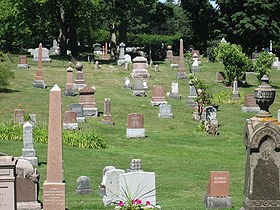Cataraqui Cemetery
This article needs additional citations for verification. (February 2009) |
| Cataraqui Cemetery | |
|---|---|
 Cataraqui Cemetery. | |
 | |
| Details | |
| Established | 1850 |
| Location | |
| Country | Canada |
| Size | 91 acres (0.37 km2) |
| Website | |
| Official name | Sir John A. Macdonald Gravesite National Historic Site of Canada |
| Designated | 1938 |
| Official name | Cataraqui Cemetery National Historic Site of Canada |
| Designated | 2011 |
Cataraqui Cemetery, in Kingston, Ontario, Canada, is the city's largest and oldest still active with over 46,000 interments. Cataraqui Cemetery continues to offer the greater Kingston area a variety of interment, cremation and memorialization options and services. The Cemetery is most noted as being the burial site of Canada's first prime minister and a Father of Confederation, Sir John A. Macdonald. Macdonald's gravesite, and the cemetery itself, are both designated as National Historic Sites of Canada.[1][2]

The Charter of The Cataraqui Cemetery Company was handed down on 10 August 1850, by the Legislative Assembly of the Province of Canada. The Cataraqui Cemetery is unique in that it is owned collectively by the Interment Rights Holders or "patrons" of the Cemetery. It operates as a not-for-profit, non-denominational, reform cemetery. The Cataraqui Cemetery Board of Trustees is elected from the Interment Rights Holders. Sir Alexander Campbell (a Father of Confederation and law partner of Sir John A. Macdonald) served as the Board's first President. The Board is accountable for all aspects of the Cemetery by delegating responsibility of the operations to the General Manager and a full-time staff. A volunteer citizen advisory committee also assists the Board and Management with the stewardship of the cemtery.
The Cemetery was developed using the Rural or Garden theme, after the pattern of Mount Auburn near Boston and Mount Hope in Rochester, New York. The 91-acre cemetery includes roadways winding through rolling wooded terrain, ponds and watercourses all laid out in the Picturesque style of landscaping. Cataraqui Cemetery predates other notable Canadian cemeteries such as Beechwood Cemetery in Ottawa Ontario, Mt Pleasant Cemetery in Toronto Ontario and Mount Royal Cemetery in Montreal Quebec.
Located within the Cemetery office, is a dramatic stained glass window commissioned in 1891 in memory of Sir John A. Macdonald. Originally installed in a church at Redan, north of Brockville, it was salvaged from the church and donated to the Cemetery in 1980 when the current Office/Crematorium was built.
Other historically notable occupants include:
- Thomas Kirkpatrick, first mayor of the Town of Kingston
- John Counter, first mayor of the City of Kingston
- Sir Alexander Campbell, a Father of Confederation and a former Lieutenant Governor of Ontario
- Wallace Bruce Matthews Carruthers founder of the Canadian Signal Corps, the first independent signalling corps in the British Empire
- Evan MacColl, the Loch Fyne Bard
- Zachary Taylor Wood, Commissioner of the North-West Mounted Police (NWMP) and Commissioner of the Yukon Territory of Canada.
War Graves
The cemetery contains the war graves of 61 Commonwealth service personnel from World War I (39 of which are in the War Plot) and 84 from World War II.[3]
References
- ^ Cataraqui Cemetery National Historic Site of Canada. Directory of Federal Heritage Designations. Parks Canada. Retrieved 25 April 2012.
- ^ Sir John A. Macdonald Gravesite. Canadian Register of Historic Places. Retrieved 25 April 2012.
- ^ [1] CWGC Cemetery Report.
- Cataraqui Cemetery
- Jennifer McKendry `Into the silent land : historic cemeteries & graveyards in Ontario` Kingston, Ont. :, c2003.
- Jennifer McKendry `Weep not for me : a photographic essay and history of Cataraqui Cemetery` Kingston, Ont. c1995.
- John H. Grenville `An illustrated guide to monuments, memorials & markers in the Kingston area` Kingston Historical Society Plaque Committee, Kingston, Ont. : Kingston Historical Society, 2000.
